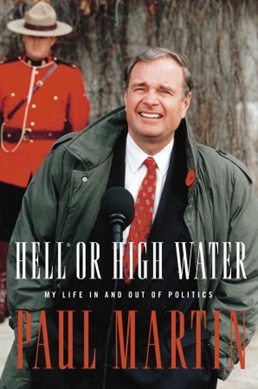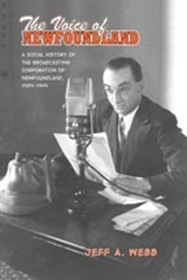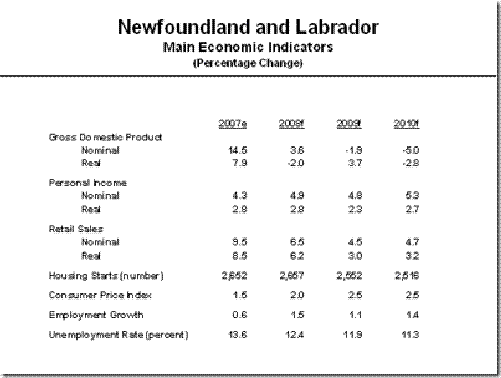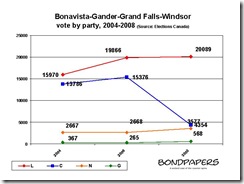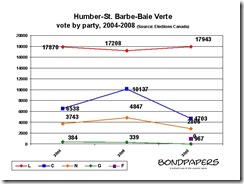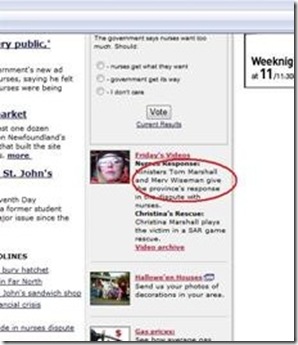Today's federal shuffle would be one of those occasions. Yes, the people in the jobs deserve some recognition, but beyond noting that Gary Lunn received a royal demotion or that Bev Oda is still in cabinet in the same job - Heavens knows why - there isn't much in the news to deserve much thought.
From a Newfoundland and Labrador perspective, it may well be that the best news in many years to come from a federal cabinet is that there isn't a regional minister for this province who actually comes from this province.
The local cult of personality over the past five years has tended to personalize everything, including the importance of having a single individual to "fight for Newfoundland and Labrador." That perspective led to first John Efford and Loyola Hearn being targeted for attack by a particular political faction largely because they offered a potential challenge to the existing self-described embodiment as an alternate locus of political power. [continued below]
| In all important aspects of national politics, guile, compromise and a subtle kind of blackmail decided their course and determined their alliances. They appeared to discount all political or social ideologies, save nationalism. For the mass of the people the words Tory and Grit, Conservative and Liberal, referred neither to political ideologies nor to administrative techniques. They were regarded only as meaningless labels, affixed to alternatives which permitted the auctioneering of one's support; they had no more meaning than bleu or rouge, which eventually replaced them in popular speech. [They] on the whole never voted for political or economic ideologies, but only for the man or group which stood for their ethnic rights... In such a mental climate, sound democratic politics could hardly be expected to prevail, even in strictly provincial or local affairs where racial issues were not involved.... |
That political frame resurrected an old collective perception of Ottawa solely as a source of dole that came from the Smallwood years. Our expectation that political success is defined solely on a politicians ability to bring home pork for the federal larder comes from the way Newfoundlanders and Labradorians received their orientation to federal politics after 1949. The Smallwood legacy in that regard is not merely lingering, it has become once more the official view.
Now to be fair, there is a tradition of some rather powerful figures from this province, including the likes of Don Jamieson and John Crosbie. But to be really fair, their power came from their ability to discharge their responsibilities to the country as a whole as well as their inherent political and managerial skills.
People who head off to Ottawa as provincialist representatives for their own corner of the universe, and who ceaselessly work only for that patch tend to wind up - to a greater or lesser degree - like individual Blocheads: pretty much incapable of influencing things to any significant degree.
Newfoundlanders and Labradorians can look to their federal representatives to represent their interests in dealing with the Government of Canada and in reflecting their views on national issues debated in the national parliament.
As for provincial government issues - revealed in the begging letters to Ottawa during the last election - the job now falls to the individual provincial ministers to work with their federal counterparts as needed. The standard for judging their performance just shot up dramatically. They don't have that convenient scapegoat anymore and high-pitched bitching will no longer be a convincing substitute for making the case and getting the job done.
On the municipal level, the effect of the last federal election might also be sorely felt. The folly of electing inexperienced municipal representatives, particularly ones with a tendency to play petty political games or work their partisan connections, may show itself to be useless.
The end result at the provincial and municipal level may be that the job specs get boosted up a fair bit beyond where they've been for the past number of years.
At the same time, the potential exists for a fundamental shift in how Newfoundlanders and Labradorians - individually and collectively - look at federal politics.
Maybe, just maybe, some 60 years after Confederation, Newfoundlanders and Labradorians will shuck off the frame used by generations of provincialist politicians and finally participate fully in the nation's political system as they should.
We must be masters of our own house, but our house is all of Canada.
